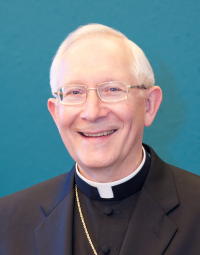
Archbishop Leonard P. Blair
In this new year, the 2,022nd Year of Our Lord, may our archdiocesan family of faith and each of us individually be blest with all the good things that are truly important in God’s eyes.
2022 marks the beginning of a concentrated effort by the Church in our country to reinvigorate faith in the “gift and mystery” of the Holy Eucharist. At our meeting last November, the U.S. Bishops approved a multi-year plan for proclaiming, catechizing and celebrating this sacrament.
By “Eucharist” we mean both the Mass and the Body and Blood of Christ under the forms of bread and wine. This is a divine reality instituted by Christ at the Last Supper, and now continually enacted by Christ Himself through the priest ordained to act not only in His name, but in His very Person. When we celebrate the Eucharist, we are, as St. Paul says, only “handing on what we ourselves have received.” (cf. 1 Cor 11:23-26)
A number of concerns prompted the bishops to act. The first is the decline in participation at the Sunday Eucharist on the part of many who identify themselves as Catholic. This reflects the wider phenomenon of non-participation in many of the familial and communal rituals that were once part of most people’s lives. This has been exacerbated by the pandemic. Participating at Mass on social media provides a vital lifeline during quarantine, but it cannot substitute for actually gathering in person and receiving the Body and Blood of Christ in Holy Communion at Mass.
A second concern is related to the first; namely, the growing number of surveys which suggest that a significant number of Catholics either do not understand or do not accept the Church’s faith that after the consecration at Mass the appearances of bread and wine remain (color, shape, weight, chemical composition) but the “substance,” that is, the underlying reality, is now and remains, the Body and Blood of Christ. The realism of this miracle comes from Christ Himself who said: “Very truly, I tell you, unless you eat the flesh of the Son of Man and drink his blood, you have no life in you … for my flesh is true food and my blood is true drink.” (Jn 6:53,55)
A third concern is one also voiced at our Archdiocesan Synod, namely, “a sincere desire … for a recommitment on the part of both clergy and laity alike to enhance and/or transform the quality of the liturgical experience in a comprehensive and consistent way.” In other words, our celebrations of Sunday Mass need to be reverent, prayerful, beautiful, inspiring, instructive and inspirational. And as Pope Francis recently urged, every bishop is “to be vigilant in ensuring that every liturgy be celebrated with decorum and fidelity to the liturgical books promulgated after Vatican Council II, without the eccentricities that can easily degenerate into abuses.”
I conclude with these challenging words of the late Pope St. John Paul in his encyclical on the Eucharist, Ecclesia de Eucharistia:
Many problems darken the horizon of our time. We need but think of the urgent need to work for peace, to base relationships between peoples on solid premises of justice and solidarity, and to defend human life from conception to its natural end. And what should we say of the thousand inconsistencies of a “globalized” world where the weakest, the most powerless and the poorest appear to have so little hope!…For this reason too, the Lord wished to remain with us in the Eucharist, making his presence in meal and sacrifice the promise of a humanity renewed by his love…. Proclaiming the death of the Lord “until he comes” (1Cor 11:26) entails that all who take part in the Eucharist be committed to changing their lives and making them in a certain way completely “Eucharistic.”
May 2022 see the beginning of a true Eucharistic renewal in our archdiocese, both in our manner of celebrating it and in our manner of living it. God bless you.
